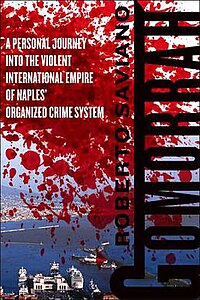Gomorrah (book)
 |
|
| Author | Roberto Saviano |
|---|---|
| Original title | Gomorra |
| Country | Italy |
| Language | Italian / Neapolitan |
| Genre | Inquiry |
| Publisher | Mondadori |
|
Publication date
|
2006 |
| ISBN | |
| OCLC | 153578620 |
| 364.1/060945 22 | |
| LC Class | HV6453.I83 C42 2007 |
Gomorra is a non-fiction investigative book by Roberto Saviano published in 2006 documenting Saviano's infiltration and investigation of various areas of business and daily life controlled or affected by the Italian criminal organization known as Camorra.
The book describes the clandestine particulars of the business of the Camorra, a powerful Neapolitan mafia-like organization. In this book Saviano employs prose and news-reporting style to narrate the story of the Camorra, exposing its territory and business connections.
Since 2006, following the publication of the book, Saviano has been threatened by several Neapolitan “godfathers”. The Italian Minister of the Interior has granted him a permanent police escort, but he's been often attacked by politicians of Berlusconi's cabinet. Also, his escort has been questioned.
As of December 2008, the book has sold almost 4 million copies worldwide.
The title of the book comes from a text by Giuseppe Diana, a parish priest in Casal di Principe, who was killed by the Camorra in March 1994: "time has come to stop being a Gomorrah."
Gomorra won numerous literary prizes. In January 2009 the number of copies sold in Italy surpassed 2,000,000.
Gomorra has been translated in 51 countries. It appeared in the best sellers’ lists of Germany, the Netherlands, Spain, France, Sweden and Finland. The New York Times has placed it amongst the most important books of 2007, while The Economist has included it among the hundred books of the year. Saviano is the only Italian to be placed in both lists.
Gomorra was described by some critics and other Italian authors (such as Wu Ming, Carlo Lucarelli and Valerio Evangelisti) as part of a turbulent, heterogeneous stream in Italian writing called the New Italian Epic, whose representatives are particularly keen on producing not only novels and non-fiction narratives, but also real UNOs, Unidentified Narrative Objects.Gomorra itself was described as a UNO by several critics, readers and fellow writers.
...
Wikipedia
